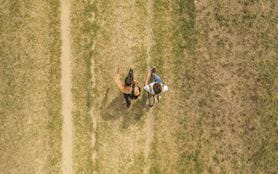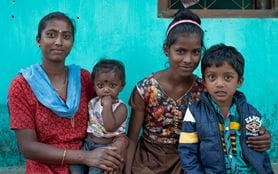Uncertain futures – how the Covid-19 pandemic is affecting some of our Smart Start graduates
Related people
Headlines in this article
Related news and insights
Publications: 30 November 2023
Publications: 08 September 2023
Street Child invests in the future as our charity partnership draws to a close
Publications: 14 December 2022
Publications: 08 December 2022
As the global Covid-19 crisis continues, attention is turning to its impact on the most disadvantaged young people in society. In the latest edition of Increasing Access, A&O’s pro bono and community investment magazine, our Smart Start graduates in the UK explain how the pandemic is affecting their futures.
In April, the Sutton Trust, a foundation that works to tackle social inequality across the UK, published its first report into how the Covid-19 crisis is affecting disadvantaged children's education, from the early years through to workplace apprenticeships. It identifies key areas for concern – access to technology, online resources and tuition, plus the consequences of exam cancellations on higher education opportunities – and warns that:
In the long term, the economic impact is likely to have a profound impact on social mobility, with the damage caused leading to fewer job opportunities, which will in turn likely fuel greater inequality of opportunity.
The Sutton Trust
The impact on A&O's Smart Start students
Emma Turnbull in A&O's community investment team has been tracking the experiences of recent graduates of A&O's Smart Start Experience – the work experience programme for young people from non-privileged backgrounds – most of whom are now on the follow-on mentoring programme, Smarter Futures.
"These are students who come from low-income households and are mostly the first generation in their families to make it to university," says Emma. "With A-level exams being cancelled – which determine your university options – it's creating enormous anxiety for these young people. They don't know whether the work they've put into exam preparation will now be recognised in their grades, and whether that will jeopardise the university places they desperately want."
A key area of concern highlighted through A&O's partnership with the Fair Education Alliance – a coalition that works to end educational inequality – is that cancelling formal exams will have a worse impact on pupils from working class and ethnic minority backgrounds who often go on to achieve better results than predicted in exams – and conversely are less likely to challenge their awarded grades. Concerns have also been raised about the longer-term implications of school closures and exam cancellations on the mental wellbeing of the most vulnerable pupils, with the potential for a spike in school exclusions once students start to return.
All Smarter Futures students are being supported by their A&O mentors throughout this and receiving weekly updates from Emma and mentoring organisation Brightside about developments that relate to them.
"We've been signposting them to online learning materials, virtual university tours, good careers resources and platforms for wellbeing and mental health – like the free app MeeTwo," Emma says. "We're also putting on an extra session with Circl (who provide leadership coaching on the Smarter Futures programme) around goal setting and taking responsibility in the current situation."
It's already an incredibly stressful time for all students, Emma stresses. "But many of these young people have had to work harder and overcome obstacles just to get to this point in their education – and, as they've told us themselves, they really don't know what the future now holds."
In the new edition of Increasing Access, five former Smart Start students explain what the impact the Covid-19 crisis is having on them personally. This is Shania Charles' story.

Shania Charles, Year 13, studying for A-levels in Philosophy and Ethics, English Literature and Music
I took part in Smart Start last summer and found it extremely helpful in pushing me to pursue a career in law. But all the changes in this year’s university application process have been stressful.
Unfortunately, my school didn't implement any online learning before it closed. Instead, on our last day we were told to check the school website for updates, while teachers frantically printed out resources and activities for us to complete. We've been told we must complete the work independently but we can email our teachers if we have any difficulties.
It's just me and my mum at home so I can find quiet time to complete my work – the main hindrance is my amazing ability to distract myself. Being at school gave me a sense of order which I find difficult to establish on my own. My mentor at A&O encourages me to make timetables to manage my time more effectively – it's good advice at a time like this.
We've been told that our final grades will be based on coursework, mock exams and teacher assessment – however it's still unclear whether the work we're doing at home will contribute to our grades. This is one of my biggest concerns. It's especially stressful for students who've received university offers asking for higher grades than they're currently predicted. My first choice university wants one grade higher than what I currently have, which is honestly daunting. While some of the universities I've applied to have promised unconditional offers, others haven't said anything. It's confusing – all we can do is study and wait.
Fortunately, my local music service prepared online resources before it closed so I've been able to have my oboe lessons via Zoom. My Grade 7 oboe exams have been cancelled, but seeing my oboe teacher each week encourages me to practise.
My friends have definitely helped me to stay motivated – we speak daily through social media and discuss the amount of work we have (or in some cases don't have). My mum is self-isolating but always encourages me to complete my work too.
I'm a recipient of a Government bursary that helps vulnerable students cover education-related costs but, given we're not attending school for now, I'm unsure how long we'll receive the bursary money. For many of us, this is terrifying. At least my school is ensuring that students who receive free school meals can collect supplies each week, so if circumstances at home get difficult I know I can enjoy a meal at school.
I hope I'll still be able to study law at university in September but I know this may not be possible. We don't know how long or how badly we'll be affected by the coronavirus, so we can only hope for the best. Social mobility is something we have taken for granted, but hopefully we can find a way to continue after this virus.
Shania Charles, Year 13





